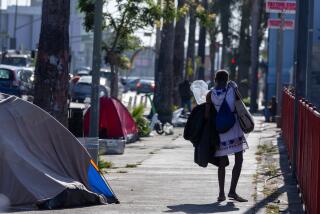Bay Area voters decide tech industry should pay its dues

The technology industry has turned the Bay Area into an economic powerhouse that many of the world’s most valuable companies call home. But the influx of well-paid tech workers has also clogged the region’s infrastructure and sent housing prices soaring, exacerbating a homelessness crisis on the streets of San Francisco.
In two ballot measures Tuesday that amounted to a regional referendum on how much tech corporations should contribute to the common good, voters in San Francisco and in Google’s hometown of Mountain View decided that some wealth redistribution was in order.
“These companies have more money than God, and it’s fair for them to pay their share above the existing taxes and donations they already make,” said Mountain View Mayor Lenny Siegel, who spearheaded the successful effort to pass a head tax aimed squarely at Google.
The more contentious referendum was San Francisco’s Proposition C, which adds a new bracket to the city’s tax on gross receipts for companies bringing in more than $50 million a year. It requires that proceeds from the new tax go solely to providing permanent housing, rent support and services for San Franciscans who would otherwise be homeless.
In an analysis, the San Francisco office of the controller estimated that 300 to 400 businesses will be affected by the tax, which will add as much as $300 million a year to the $380 million the city currently spends on services and housing related to homelessness, including rent subsidies and shelters.
“We have tremendous wealth in San Francisco and we have people who are literally dying on our streets,” said Jennifer Friedenbach, director of the Coalition on Homelessness, who led the effort to pass Proposition C. “It’s a pretty simple equation.”
The proposition gained prominent opponents early on.
Democrats including recently elected Mayor London Breed and state Sen. Scott Wiener joined the San Francisco Chamber of Commerce in arguing that Proposition C failed to create a system of oversight for the new funds. The influx of funding “could make our homelessness problem worse” by attracting more people in need to the city, and the additional tax would harm the local economy, Breed said in a statement.
“Even though these investments can be very impactful, simply spending more money does not guarantee you’ll see improvements,” Wiener said. “We have a brand-new mayor who has been clear that homelessness is her No.1 priority, and I believe that we should give her space to lead on this issue.”
Executives at tech firms that process payments, including Jack Dorsey, chief executive of Square, and Patrick Collison, chief executive of Stripe, said the tax unfairly targeted financial services businesses like their own, which had already been taxed at a higher rate than other sectors.
Salesforce CEO Marc Benioff emerged as a champion of the proposition, pouring almost $8 million into campaign coffers by election day. He publicly argued with proposition opponents, such as Dorsey and Zynga co-founder Mark Pincus, chiding on Twitter that “the homeless have been left behind by You & the other 70 SF billionaires.”
The proposition passed with 60% of the vote. The city controller’s office said Wednesday that collection will begin in 2019, but noted that funds won’t be allocated until the resolution of a lawsuit filed by the Howard Jarvis Taxpayers Assn. over a June ballot measure, which calls into question whether new taxes need a two-thirds majority to go into effect.
In the Silicon Valley city of Mountain View, voters opted to alter the city’s business license fee, which had stayed flat at $30 per company for decades, to one that changes based on the size of the company’s workforce.
A business with fewer than 50 employees will now pay a flat fee between $100 and $450 for registration and licensing. The bill for a company with 5,000 employees would climb to $584,070. And Google, whose estimated Mountain View workforce of 23,000 dwarfs its neighbors, is slated to pay more than $3 million a year under the new regime.
Google declined to comment on the measure, as did the two pro-business lobbying organizations, Silicon Valley Leadership Group and Bay Area Council, that had publicly opposed the measure in City Council sessions before it was put on the ballot.
With no organized opposition, the new tax passed with more than 69% of the vote and is set to go into full effect in 2022. Money raised will go to the city’s general fund, but the City Council passed a resolution to earmark most of it for transit infrastructure.
“We do not have a hostile relationship with Google in Mountain View,” said Siegel, who lost his own reelection campaign. “Google donates to all kinds of things, but for the kind of capital investments you need for transportation, we need a steady stream of revenue to raise bonds.”
Though technology companies have faced some public backlash in the Bay Area, including high-profile protests over employees’ shuttle buses, these twin ballot measures are a rare instance when voters have pushed back against the industry.
Cupertino, the hometown of Apple, considered giving voters a chance to put a head tax on its main employer before shelving the idea this year. The Seattle City Council passed a head tax to fund affordable housing and homelessness services on its resident behemoth, Amazon, in May, only to overturn the tax in June in response to pressure from the company.
Follow me on Twitter: @samaugustdean







